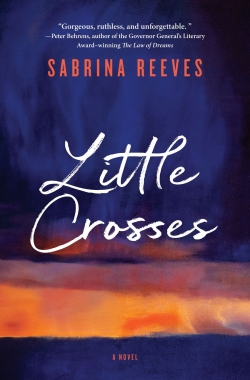When actor and author Sabrina Reeves, MA 19, was a graduate student at Concordia, she started to write what would become her recently published debut novel, Little Crosses (House of Anansi Press).
The story, about a woman who reflects on her fraught relationship with her mother — a force of nature who suffers from alcohol-related dementia — was deeply personal.
“I had another idea in mind, but this book was so much a part of my life that my partner urged me to focus on it,” says Reeves. “He knew how much I was living the story in real time.”
As she completed her master’s in creative writing, Reeves travelled to Santa Fe, New Mexico to assist her mother — who, like the mother in Little Crosses, suffered from dementia and alcoholism — as she transitioned to an assisted-living facility. Reeves’s mother passed away in 2020.
“I realized how angry I was, but anger is really just grief,” she says. “I just wanted her to be present. I wanted to talk to her, but she wasn’t there anymore.”
Released on March 19, Little Crosses has earned positive reviews.
“If a narrative about a mother descending into alcoholic dementia sounds too downbeat a read (or just too close to the bone), Reeves’s tale proves just the opposite,” wrote the Toronto Star. “By turns uplifting, profound, angry, she is never disengaged, never boring.”
Stage presence
Raised in Boston and New York, Reeves first graduated from Pittsburgh’s Carnegie Mellon University School of Drama with her BFA. She then moved back to New York, where she acted on stage and screen.
It was while in the Big Apple where Reeves met her husband, David Usher, the lead singer of the Canadian rock band Moist who has his own connection to Concordia. The Montreal-based couple have been married for 27 years and have two daughters.
Soon after Reeves moved to the city in 1997, she co-founded bluemouth inc., a not-for-profit performance collective that puts on immersive events for audiences in alternative spaces.


 Sabrina Reeves, MA 19 | Photo credit: Tony Chong
Sabrina Reeves, MA 19 | Photo credit: Tony Chong
 Reeve’s semi-autobiographical work examines addiction, family dysfunction and a complicated mother-daughter relationship.
Reeve’s semi-autobiographical work examines addiction, family dysfunction and a complicated mother-daughter relationship.